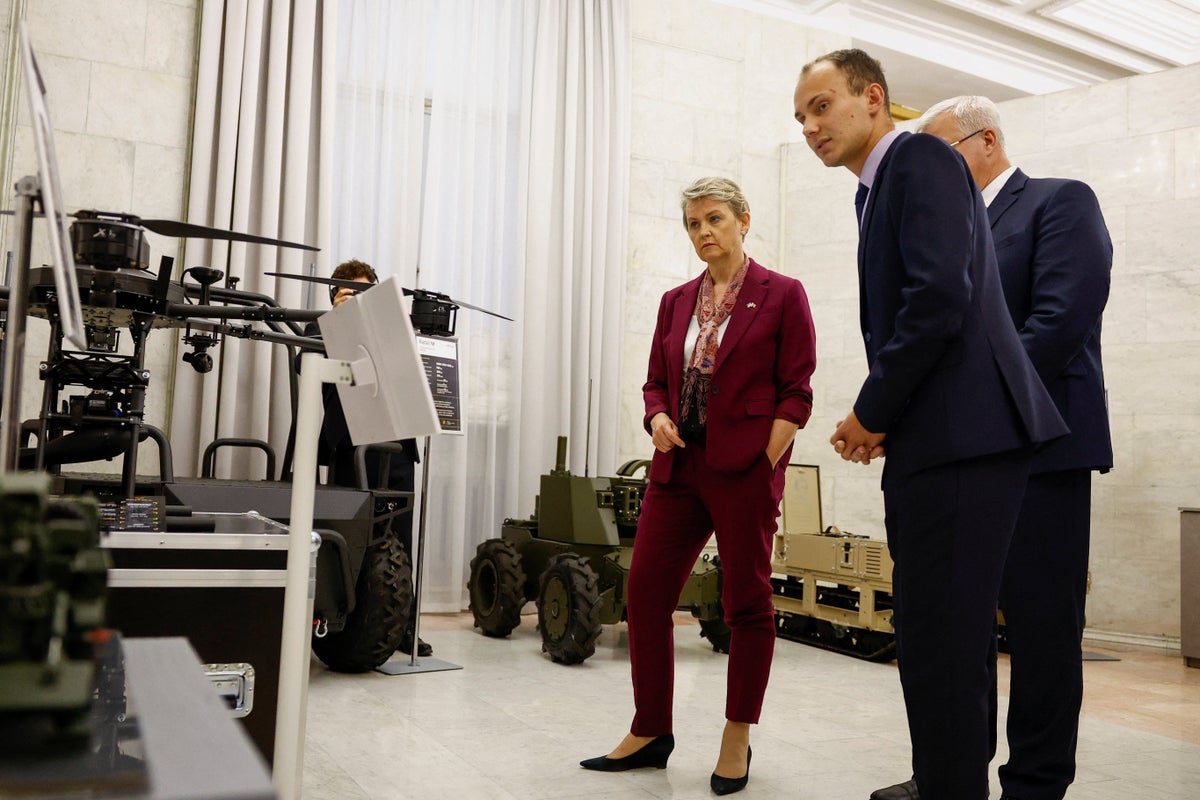
The Government has sanctioned Russia’s biggest oil producer Rosneft as part of its latest set of measures targeting Russia’s economy amid the war in Ukraine.
Foreign Secretary Yvette Cooper announced Rosneft, along with Lukoil – two of the world’s largest energy companies – would face restrictions from the UK.
The Foreign Office said the two firms export 3.1 million barrels of oil a day. Rosneft, Russia’s largest firm, is responsible for 6% of global oil production, and makes up nearly half of Russian oil produced.
Other action was taken against the so-called “shadow fleet”, which allows Russia to export oil.
The sanctions stop UK businesses and individuals from trading with the named Russian entities.
They came as the speaker of the Ukrainian Parliament visited the House of Commons on Wednesday.
Speaking in the Commons, Ms Cooper said: “We will ramp up the pressure on Russia to ensure that their escalation comes at a clear cost.
“So I am today setting out a further new set of sanctions, among our strongest so far, to tighten the pressure on Russia’s economy.”
The measures are the second announced in a month, and Ms Cooper indicated that more could follow.
More than 2,900 Russian individuals, bodies and companies have been sanctioned by the UK Government since Russia’s invasion in February 2022.
She added: “We are sanctioning Russia’s two largest oil producers, Rosneft and Lukoil, the two biggest Russian energy firms ever targeted by UK sanctions, part of an extensive new sanctions package of 90 targets, including refineries around the world which are responsible for importing Russian oil, suppliers of drone and missile components, and 44 shadow fleet vessels, further disrupting the network of tankers that transport Russia’s oil.”
She said she had told Russian foreign minister Sergei Lavrov at the UN last month: “We will target your ailing economy, your oil and gas revenues and the defence industry making your munitions because we know for Russia, the cost of war is piling up.”
Shadow foreign secretary Dame Priti Patel said: “We must ensure Russia’s defeat goes down in history. To do so, Britain must lead all allies to raise the price of Russia for its aggression by cutting off Russia’s financial lifelines.”
Her comments came as Rachel Reeves is in Washington DC for a meeting of the International Monetary Fund where she will meet G7 finance ministers.
A roundtable is due to take place to discuss further restricting Russia’s economy, which is heavily reliant on international oil revenues.
Dame Priti named India, China and Turkey as three countries helping Russia earn £1 billion a day in oil revenues.
Meanwhile, Defence Secretary John Healey said Nato would meet Moscow’s “escalation with our strength” ahead of a meeting of the defence alliance amid a surge in Russian drone strikes in Ukraine and “totally unacceptable” incursions into European airspace.
Mr Healey will attend the first gathering of Nato defence ministers since a series of drones violated European skies in recent weeks.
The alliance is seeking to bolster defences on Europe’s eastern flank after its jets downed drones over Poland and Estonia said Russian jets flew into its territory.
He is also co-hosting the latest meeting of the Ukraine Defence Contact Group in Brussels.
The Cabinet minister said: “The UK and Nato nations are meeting today to ramp up our response to Russia’s aggression.
“(Vladimir) Putin’s incursions into Nato territory are reckless, dangerous and totally unacceptable.
“Deliberate or not, Putin is watching what we do. And Putin should be in no doubt: if Nato is threatened, we will act.
“And we must meet his escalation with our strength.”
Mr Healey confirmed the UK’s participation in Nato’s Eastern Sentry mission, with RAF Typhoon fighter jets patrolling Poland after Russian drone incursions last month, will continue until the end of the year.
He also announced an increase in drone production for Ukraine, with the UK delivering more than 85,000 of the weapons over the last six months.
The UK will also deploy military counter-drone experts to Moldova.
He added: “Putin seeks to test, to divide, to distract. Nato nations step up to deter, to unite, stronger together than ever.”
Mr Healey is expected to hold a press conference at 5.40pm alongside Ukraine’s defence minister Denys Shmyhal and Germany’s Boris Pistorius.
Elsewhere, Ruslan Stefanchuk, the chairman of Ukraine’s Verkhovna Rada, celebrated the 100 Year Partnership Agreement entering into force as he visited London.
The deal was signed by Sir Keir Starmer and Ukrainian President Volodymyr Zelensky in Kyiv in January with the aim of boosting defence and scientific collaboration and forging new community links between the two countries.
Mr Stefanchuk told a crowd of parliamentarians gathered in Portcullis House that he was delivering a diplomatic note bringing the deal into effect.
